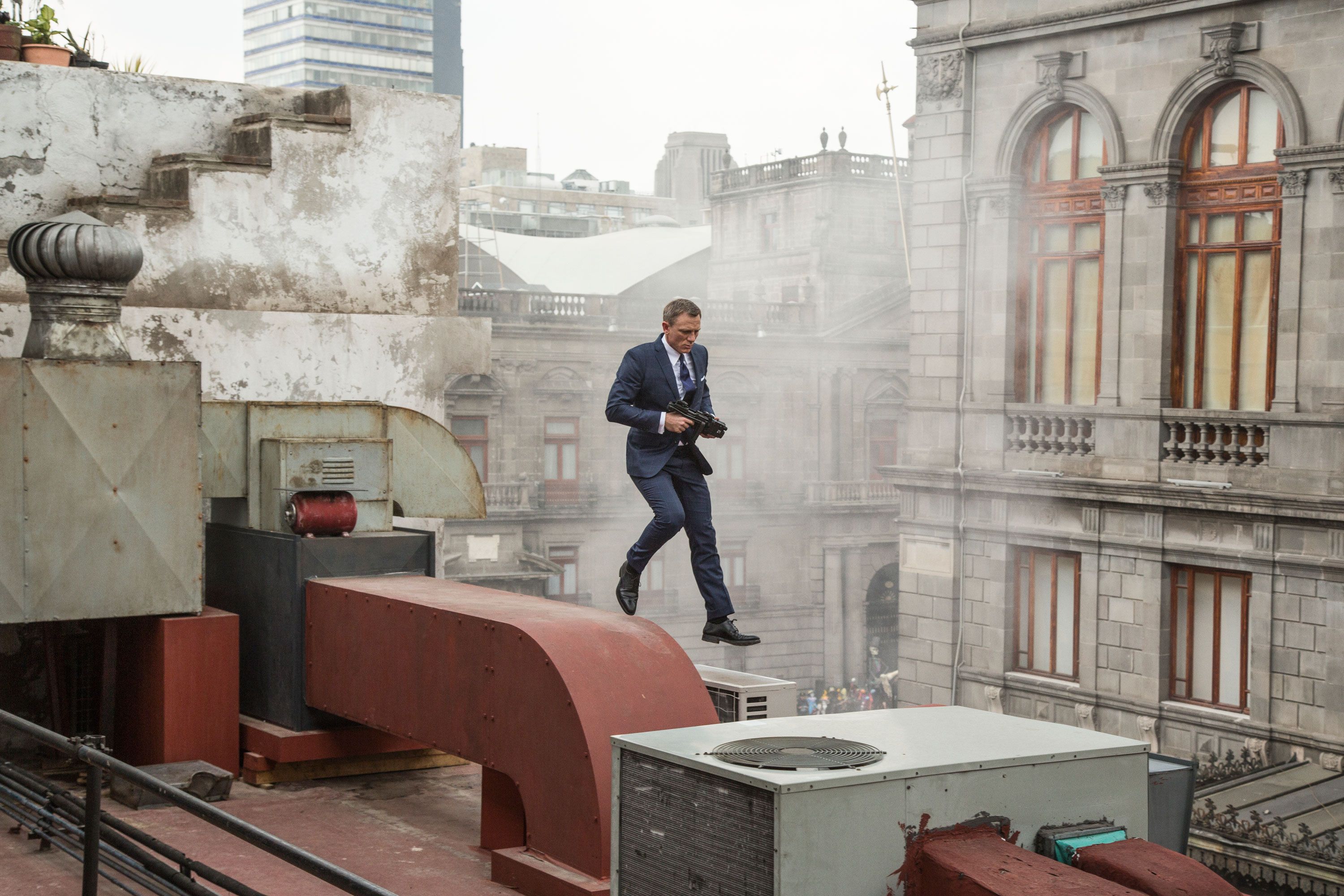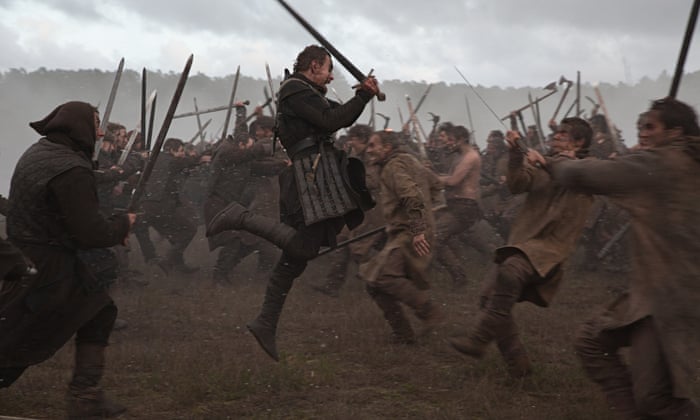Spectre2015 Directed Sam MendesThe new Bond opens on the Day of the Dead in Mexico City, with tens of thousands of masked people in the streets, with music, drumming, elaborate floats, men in black suits with white skeletons drawn on their backs, women in flowing Latin dresses. Bond is, of course, in the middle of this, with a beautiful woman, although we only find this out - that the person we are following (who is following someone else) is Bond, and that the woman is beautiful - when they get to their hotel room and de-mask. Perhaps, we think, she thinks, they will now make love. It is not to be. In one of the finest and most understated takes in the whole film Daniel Craig climbs out of the window, walks along the very edge of the parapets of several tall buildings, the revelry continuing, vertiginously, several stories below. He’s carrying an unusual kind of automatic weapon. He moves with ease and grace. He’s not being chased or chasing, just travelling to his destination, oblivious to the danger. You don’t need to know more. Suffice to say there will be explosions, collapsing buildings, helicopters. All before the credits. In many ways this opening sequence is the best part of the film – which is not to say that there are not some delightful set pieces, that the film is not entertaining – it’s just that, at this stage, there is no plot, the only narrative we have is Bond’s casual ease with heights, his singular poise and purpose, his actions in defence of innocent people, and this gives the scene a freedom which the rest of the film would dearly love to have, weighed down, as it is, by clumsy sub-plots, vendettas, old alliances and new loves.Let me declare my biases: I like Bond films. I particularly like Daniel Craig as Bond. When, in Skyfall – once again in an opening sequence – he boards the train, protects himself from being shot by climbing into the cabin of a front-end loader on a float car and then, miraculously, delightfully, thwarts his enemy’s ploy of disengaging the railcars by grabbing the carriage in front with the arm of the aforementioned metallic beast, ripping half its roof off in the process, when he has crawled up the arm and dropped down into the passenger car, full of tremulous innocents, he straightens up, stops for a moment. He stops to adjust his jacket and to shoot his cuffs. Only then does he leap forward to continue pursuing his enemy. That moment is, in my mind, worthy of the whole rollicking, enormous, over-priced, over-blown, worn out franchise.The problem with that film, Skyfall, and, even moreso, with Spectre, and I think I can talk about this without giving spoilers, is that the plots are asinine. Not because Bond survives where several hundred others (including the arch-enemy and a couple of beautiful women) die. That’s never really been the issue; we’re in the business here of the voluntary suspension of disbelief. The problem is that the stories have become centred around Bond himself. The evil genius who is bent on world domination, in these new iterations, is not surprised or even dismayed to find Bond at his heels, interfering with his plans. Bond is, rather, at the centre of his plans. Bond is his raison d’etre, Bond is the kernel of pain at the core of his existence. Elaborate back stories are woven to create this, adoptions, substitutions, mentorships. But this focus on him as the familial member who must be overcome on the path to world domination – as if, in fact, world domination is secondary to humiliating Bond, detracts from the enjoyment in the films in such a profound way that it is all but impossible to put disbelief aside.I don’t want to discover that Bond knew the arch-villain when they were children and one or other of them offended someone. I couldn’t give a rat’s arse to be honest. I’m not in the cinema for a psychological assessment of childhood hurt and how it has given rise to the present villain or the present Bond, I’m there to be blown away by the sheer grandiose hubris of the villain’s plans, his or her delusions of grandeur which should be, it must be said, fantastic, overblown, and slightly scary. I’m here to see Bond, against all odds, foil these plans and rescue the girl (although, it must be said, in this new film the girl has at least some agency, which is a great relief).What has happened recently in the series is that the requirement for an ‘origin story’ has overtaken the genre under the rubric of what Hemingway referred to as ‘the trauma theory of literature’. As I said a moment ago, who cares? Bond films are not literature and we don’t want this guff pasted on them in the hope of making them so. Bond is not a character we love because he was badly treated as a child. We love him because he knows how important it is to be well dressed when dropping into a train carriage, or going into a bar, a ballroom, or a battle. Cut the nonsense please, and give us some real nonsense instead.
In many ways this opening sequence is the best part of the film – which is not to say that there are not some delightful set pieces, that the film is not entertaining – it’s just that, at this stage, there is no plot, the only narrative we have is Bond’s casual ease with heights, his singular poise and purpose, his actions in defence of innocent people, and this gives the scene a freedom which the rest of the film would dearly love to have, weighed down, as it is, by clumsy sub-plots, vendettas, old alliances and new loves.Let me declare my biases: I like Bond films. I particularly like Daniel Craig as Bond. When, in Skyfall – once again in an opening sequence – he boards the train, protects himself from being shot by climbing into the cabin of a front-end loader on a float car and then, miraculously, delightfully, thwarts his enemy’s ploy of disengaging the railcars by grabbing the carriage in front with the arm of the aforementioned metallic beast, ripping half its roof off in the process, when he has crawled up the arm and dropped down into the passenger car, full of tremulous innocents, he straightens up, stops for a moment. He stops to adjust his jacket and to shoot his cuffs. Only then does he leap forward to continue pursuing his enemy. That moment is, in my mind, worthy of the whole rollicking, enormous, over-priced, over-blown, worn out franchise.The problem with that film, Skyfall, and, even moreso, with Spectre, and I think I can talk about this without giving spoilers, is that the plots are asinine. Not because Bond survives where several hundred others (including the arch-enemy and a couple of beautiful women) die. That’s never really been the issue; we’re in the business here of the voluntary suspension of disbelief. The problem is that the stories have become centred around Bond himself. The evil genius who is bent on world domination, in these new iterations, is not surprised or even dismayed to find Bond at his heels, interfering with his plans. Bond is, rather, at the centre of his plans. Bond is his raison d’etre, Bond is the kernel of pain at the core of his existence. Elaborate back stories are woven to create this, adoptions, substitutions, mentorships. But this focus on him as the familial member who must be overcome on the path to world domination – as if, in fact, world domination is secondary to humiliating Bond, detracts from the enjoyment in the films in such a profound way that it is all but impossible to put disbelief aside.I don’t want to discover that Bond knew the arch-villain when they were children and one or other of them offended someone. I couldn’t give a rat’s arse to be honest. I’m not in the cinema for a psychological assessment of childhood hurt and how it has given rise to the present villain or the present Bond, I’m there to be blown away by the sheer grandiose hubris of the villain’s plans, his or her delusions of grandeur which should be, it must be said, fantastic, overblown, and slightly scary. I’m here to see Bond, against all odds, foil these plans and rescue the girl (although, it must be said, in this new film the girl has at least some agency, which is a great relief).What has happened recently in the series is that the requirement for an ‘origin story’ has overtaken the genre under the rubric of what Hemingway referred to as ‘the trauma theory of literature’. As I said a moment ago, who cares? Bond films are not literature and we don’t want this guff pasted on them in the hope of making them so. Bond is not a character we love because he was badly treated as a child. We love him because he knows how important it is to be well dressed when dropping into a train carriage, or going into a bar, a ballroom, or a battle. Cut the nonsense please, and give us some real nonsense instead.

2015 Dir. Justin KurzelSo here is another egregious example of the mistreatment of Shakespeare: a dark, muddy, inarticulate, finely-crafted piece of gloomy emptiness, an abridged version of a great play delivered for a Game of Thrones audience who, if they even entered the cinema in the first place will have left more bewildered than those amongst us who are familiar with the play, which is to say something.When will film-makers (and wannabe stage directors) at last understand that language is the key to Shakespeare? That the plot is no more than the device, the scaffold, to support the language, to give it a structure within which to unravel? How many times is it necessary to spell it out: plot is not the essence of Shakespeare’s plays; it is, in fact, the least important part? These plays were intended to be acted on a bare stage. By all means, add sets; by all means film it in the north of Scotland at the end of winter, in the twilight hours when there’s still snow on the tops, when a freezing wind is coming in from all directions, when your actors are shuddering with the cold, but for fuck’s sake don’t cut the language to shreds and then mumble the paltry remaining lines in heavy accents in the hope it will provide gravitas.In this version we begin, unusually, with a dead baby, presumed to be that of the Macbeth’s, followed at once by a bloody battle on a moor in the mist which concludes with the witches prophesying to Macbeth that he will become the Thane of Cawdor and later King. A couple of scenes later we find Macbeth and his wife in a village somewhere in the Highlands, preparing for the arrival of the then king, Duncan.But stop for a moment. This village, extraordinarily, strangely, outlandishly, anachronistically, is constructed of timber in a manner remeniscent of nothing so much as banana sheds in sub-tropical Queensland. Anyone with even the briefest knowledge of Scotland can tell you the people built in stone. For the last five thousand years that we know of they built low houses with three foot thick walls of rock and rubble with thatched roofs. Nobody built thin-skinned timber houses with great cracks between the boards to let in streams of moody light. They didn’t do so because a) they had no timber and b) because if the gap under the door allowed in light it would also allow in wind and the cold.Does this matter? Am I getting side-tracked here complaining about details? Well, not really, because the film spends much of its time attempting to depict a credible medieval Scotland: no plaid and lots of mud, a harsh and pretty miserable existence made more so in the film by the lack of any means of support: no sign of black cattle, or creels, or lazy beds mulched with seaweed, in fact, the places people have apparently chosen to occupy seem to be the bleakest, most exposed areas of the hills, high up, away from bodies of water, a long way from the sea which was the main source of food… ach, away… enough, stop hoad your whisht… get on wi’ it; after all we’ve got Michael Fassbender playing Macbeth and Marion Cotillard with wonderful soulful deer eyes playing his wife … That night, Macbeth kills Duncan and blames the murder on Malcolm, Duncan’s son. Macbeth then goes to Inverness to live in a castle as King, as prophesied, but then he kills his best friend Banquo because he’s anxious that the witches also said that Banquo’s sons would sire a line of kings and he doesn’t have a child, which refers back, of course, to the death of the child at the beginning. Next thing he’s going mad, tortured by visions of Banquo’s ghost, so he’s off to see the witches again and they tell him it’s all right because he’ll be king until Burnim wood moves and anyway he can’t be killed by any man born of woman. The next thing he’s a tyrant, killing MacDuff’s family and before you know it Lady Macbeth is dead, she should have died hereafter, or, at least we should have had some explanation of why she died, then Malcolm, Duncan’s son is coming up with the English and, of course, McDuff was born by caesarean so he can kill Macbeth in a long drawn out fight scene on another misty moor.What we don’t have is any of the reasoning behind this. We have entire acts, soliloquies, sub-plots, excised for no apparent reason, but a number of new scenes added, as well as lots of the aforementioned moody lighting of hills and wooden interiors. We are left without any understanding of Macbeth’s ambition, or that of his wife and how these two weave together, we are left devoid of explanation for his madness, why it should be that these murders should haunt him when we have already been shown him killing so many men in battle. Or, if we do have some of this, it is given both as explication, in other language than Shakespeare’s, and delivered in heavy Scot’s brogue with no consideration for where the microphone’s boom might happen to have been while the person was speaking.What hubris took hold of the three screenwriters when they made the decision to rewrite this play? What witches concoction persuaded them that they could do it better than the bard? (one has, I note, a credit for the writing of Assassin’s Creed, which is, if memory serves, based on a computer game). But these questions cover an even more significant one: why would you bother? Cut, if you have to; re-fashion language for clarity, if it’s necessary, but to mangle the text in this way is worse than appalling. Fassbender is one of this era's great actors. Cotillard can be remarkable. Both of them, in this film, do their best to muddle through. Some sense of decency has persuaded the writers to leave in the tomorrow and tomorrow and tomorrow lines and Fassbender manages to deliver them with real force but by that time they are, no matter how marvellous their resonances, no more than words. We have not been given time to care about the man, to find it in ourselves to grieve for him no matter what he’s done (which is, after all, the tragedy at the heart of the thing). Indeed, before we know it we are in a long drawn out death struggle enacted with barely a word between the protagonists. In this director’s version it is the spectacle of the fight that is interesting; the way the swords are wielded, the lunge of the knife that fascinates, not the sorrow at a man being brought down so foully by ambition. The tragedy in this film becomes the fact that it was made at all.
The London Review of Books has published what Alan Bennett describes as a 'sermon before the University, Kings College, Cambridge'. It's available here both in text form and as a podcast. His point is quite plain, even if he takes a somewhat rambling and entertaining journey to get to it. 'My objection to private education,' he says, 'is simply put. It is not fair.'He's writing about Britain, of course, and so he's also talking about deeply ingrained traditions of class and privilege, but what he says of that country could equally be said of education in Australia. He continues: '... to say that nothing is fair is not an answer. Governments, even this one, exist to make the nation’s circumstances more fair, but no government, whatever its complexion, has dared to tackle private education … I am not altogether sure why … [one] reason why there is a lack of will and a reluctance to meddle – a reluctance, one has to say, that does not protect the state sector, where scarcely a week passes without some new initiative being announced – is that private education is seemingly not to be touched. This I think is because the division between state and private education is now taken for granted. Which doesn’t mean that it is thought to be fair, only that there is nothing that can or should be done about it.But if, unlike the Daily Mail, one believes that the nation is still generous, magnanimous and above all fair it is hard not to think that we all know that to educate not according to ability but according to the social situation of the parents is both wrong and a waste. Private education is not fair. Those who provide it know it. Those who pay for it know it. Those who have to sacrifice in order to purchase it know it. And those who receive it know it, or should. And if their education ends without it dawning on them then that education has been wasted.'Exactly. But this is the point. For unexplained reasons we keep harping on the idea that a private school education has advantages over a public one. Be it smaller class sizes, better teachers, more resources, or possibly the social network which is, literally, bought into, which pays off throughout life. But an education is something much more complicated than any of these things. When I was at a British boarding school in the 1960s, one of the elite schools of Scotland, they kept telling us that the subject matter we were studying, be it Latin, History, English, Maths, Biology, Physics, while important, was not the essential thing; that what they were trying to instil in us was a way of thinking, of looking at the world and being able to question it in an intelligent way.That's as maybe, except that this ability to question also came with its own severe restrictions. Not only did our teaching, as Mr Bennett says above, fail to awaken in us the idea that a privileged education ‘based not according to ability but according to the social situation of the parents is both wrong and a waste,’ it almost demanded we believe the opposite of that, while at the same time imposing structures of thought which led those of us unfortunate enough to be subject to their ministrations to conclude through the very way that they made us live and taught us that it was more than okay to live a life without love; that, amongst other travesties, women belonged firmly to the second sex and that to express support for any of their concerns was to show weakness.If the western world has found itself in trouble over the last few decades it is, primarily, because it has insisted on taking its leaders from this stock, believing them suited to the task of ruling despite having been ruthlessly cut off from their feelings as small children. An education which does not include an understanding of what it means to be human is not an education. Alan Bennett is, of course, primarily a playwright. Just last week, however, I had the opportunity to rewatch a copy of his wonderful film, 'The History Boys,' starring the extraordinary and now late-lamented Richard Griffiths. A film so rich in both anecdote and in its own delight in language and learning (and their eventual incapacity to ever really help us to understand what we're doing here), that I wanted to start watching it again as soon as it finished. Treat yourself to the article or the podcast; here is someone with the capacity to say what needs to be said in words that are hard to argue with.
Alan Bennett is, of course, primarily a playwright. Just last week, however, I had the opportunity to rewatch a copy of his wonderful film, 'The History Boys,' starring the extraordinary and now late-lamented Richard Griffiths. A film so rich in both anecdote and in its own delight in language and learning (and their eventual incapacity to ever really help us to understand what we're doing here), that I wanted to start watching it again as soon as it finished. Treat yourself to the article or the podcast; here is someone with the capacity to say what needs to be said in words that are hard to argue with.
Over the last year this blog has slipped into somnolence, pushed aside by family (two grandchildren, a daughter's wedding), other sorts of writing (a new novel in first draft), politics and conservation (two big tree plants and much lobbying), outspoken (Bill Gammage in July) and now ... building.In an attempt to rationalise this house we're adding an extension and replacing the deck. If I'm not too tired at night I will try to make this build, its design, its philosophical and physical implications, the subject of the blog. As well as the occasional photo.




I’m going to do my best ofs in two parts, the first, this one, is about books and television, the second one, which will, in the strange world of blogs, be above this one, discusses several posts I’ve come across during the year that have fired up my mind.Best novel: A Visit From the Goon Squad by Jennifer Egan. No competition. It’s a novel told in, if I recall correctly, twenty-three parts, each of which functions as a short story, each one told from a different perspective, jumping forwards and backwards through time, creating, piece by piece, a world that is larger than its parts. I don’t normally like this sort of thing. The change in perspective, I find, has a tendency to rob the reader of their ability to connect with any given character, but Egan does something (I’m not sure what, but I want to find out) so that, rather than getting a fragmented collection of stories, we get an overlap that pierces to the core of both the characters’, and our own, lives. An exceeding beautiful book.A safe choice you might say, in that it won the Pulitzer, but sometimes the prize givers get it right, as they did, I believe, with Julian Barnes’s The Sense of an Ending. I was reading some quite heavy non-fiction and came to this slim novel as a palate cleanser. What a delight it proved to be, the narrator winding us back down through the past, finding different meanings and interpretations with each turn of the staircase. It seems barely possible to have squeezed so much into so few words and yet have it feel clear and concise.Several other books deserve mention. Organising and interviewing for Outspoken I have to read a lot of books during the year in a way that I have not been accustomed to, sometimes three or four novels by one person (previously I’ve allowed books to come to me, as it were, now I have lists). I particularly enjoyed Ann Patchett’s Run. In this novel, Patchett stays with an event for a remarkable amount of time, she uses a single incident to introduce and develop a rich cast of characters, promiscuously shifting perspective between them, and yet, like Egan above, giving them all lives I found myself caring about. Patchett was, by the way, one of the most engaging speakers I’ve ever encountered, never mind having the pleasure of sharing a stage with. I also read a lot of Alex Miller and can recommend Journey to the Stone Country and Autumn Laing, his new novel. Further afield I loved Out Stealing Horses, by Per Petersen, set in the mountains on the border between Norway and Sweden, as well as Mortals, by Norman Rush. Talk about richness and density of prose and staying in a scene, milking every last drop from it. A remarkable novel indeed, set in Africa.Non-fiction: I can’t really separate out one and say it’s the best. I’ve recently read the first two volumes of Thomas Keneally’s The Australians, a very different way of relating history. I’ve heard it said that it’s a novelist’s view and this might be the case but many historians try to weave a narrative through the events they describe. Keneally spends time with individuals, not necessarily the Great Men, and through their stories hopes to illustrate the development of the nation. I found it fascinating, but the two books together, at 967 pages, are a big read and they’re heavy, too, to hold up in bed at night. A good argument for the ebook, although the hardbacks are very handsome. I was very taken by The Philosopher and the Wolf, by Mark Rowlands, and the last book from Tony Judt, that great historian of our time, Ill Fares the Land. Somewhere in there I managed Life by Keith Richards and friend, which also presents a stark picture of our time, or his time in the early years of the Rolling Stones. Beside my bed right now are two other non-fiction works, impatiently waiting for me to finish Patrick White’s The Eye of the Storm (struggling a bit here Patrick, sorry, these long diversions into punctuation-less prose make me drop off to sleep): How to Live, about the life of Montaigne, by Sarah Bakewell and The Better Angels of our Nature, by Steven Pinker, in which he discusses how and why violence has declined. I’ll drink to that.Television series also deserve a mention. The longer series give writers and directors an opportunity to develop character in a way that is novelistic, but also its own form. I watched several this year: Forbrydelsen, or The Killing, (Peter Brandt Nielsen) that dark tale from Copenhagen with the wonderful Sofie Grabol as the detective lead, although surely almost equally important was Bjarne Hendriksen as the brooding father.
Taken with the female detective lead and wanting to practice my French I also went over to look Engrenages, or Spiral, (Guy-Patrick Sainderichin and Alexandra Clert) but while loving Caroline Proust’s fiery detective I was put off by the crimes on which it focused. The French seem to love the gritty reality of violence, they relish bringing the camera in close on the dismembered bodies. Across the Atlantic there were two very different shows: Treme, Series Two, from David Simon, which I think was better than series one. One of the things I love about this drama is that it’s not interested in violence as a plot driver, the concern is music in its many and varied forms. Lastly can I recommend Community Series One and Two, (Dan Harmon). Fifty half hour sit-com shows of tremendous energy and humour starring Joel McHale and Danny Pudi. I came to these full of cynicism about American humour and found myself laughing out loud, delighting in the freshness of their approach. I particularly recommend the episodes about playing pool and the first series paintball.

 Let me begin by saying that Ben Whishaw makes an excellent Keats. There is a nervous frailty to him, a boy-in-the-man intensity which is ideal for the part. Abbie Cornish, too, is wonderfully cast as Fanny Brawne – although it needs to be said that I know nothing of this girl, Fanny – but Cornish is so beautiful, in a classical reflective manner, that the screen cannot have enough of her. For much of the film she has her hair pinned tightly back from her forehead with a perfect straight part which adds to the mask-like perfection of her features, the combination of her boldness and her uncertainty. Surely the camera loves her; it lingers on her face, on the pinched porcelain of her upper lip, it returns again and again to her as an object of desire, not simply for Keats, but for all of us.In the meantime Whishaw, as Keats, scribbles poetry both in the company of his garrulous Scots friend Brown, and in various more romantic locations. There are occasional snippets recited for us. Christopher Ricks in the New York Review of Books complained that Campion had felt it necessary to addend the words with pictures, so that if Keats was describing, in a poem, snow, so we had to see it, or if a nightingale, we had to hear it, and as a result of his comments I was on the watch for this but found it to be unfair, the poems themselves were understated and deftly placed – the only situation where I found myself in agreement with Mr Ricks was for the final reading, a complete rendition of Ode to a Nightingale, recited by Whishaw while the credits rolled.Here was an interesting phenomena: Keats has died, grief has set in, the film closes with an unnecessary snippet of information about Fanny wandering about the woods, and another, that Keats, when he died at 25 years old, considered himself a failure, and then cuts to the credits. Music begins, and Whishaw starts to read. He has come to embody Keats during the last couple of hours – whatever criticism the viewer might have of the film, this much is certain – and now he’s reading one of the poet’s more sublime works, and reading it well, beautifully even. But two powerful things arise to undermine him. The first is the music, which seems to bear little or no relation to the words; the piece is in three short movements and the breaks between them come arbitrarily, not even in sync with the verses, and these all too brief silences only emphasise the inappropriateness of the music, presenting as they do an opportunity to hear the man’s voice unobstructed.The second, more disturbing, thing is that the audience gets up to leave. En masse. With perhaps a little less noise than usual, but with still a smattering of talk. To this observer it seemed passing strange. All these people had been prepared to sit through two hours of a profound love story about a misunderstood poet, but couldn’t give another five minutes to listen to one of his poems. It was as if they liked the idea of the suffering poet more than the poems – which seems also to suggest that the same fate would have attended him in the modern age as it did in the nineteenth century. But then perhaps it was simply that they needed desperately to pee (my only criticism of the film was that it was a little over-long, that the drama was drawn out too far, so it could be so)(the women did not agree). Or perhaps that’s what you do when credits roll, get up.Note to Campion: if you want your audience to hear your subject’s poetry then (pace Ricks) keep the images rolling.Incidentally Whishaw did an interview for the Movie Show with David Stratton and Margaret Pomeranz where he talked about Keats’s concept of Negative Capability in a most entrancing way. That alone made me want to see the film.
Let me begin by saying that Ben Whishaw makes an excellent Keats. There is a nervous frailty to him, a boy-in-the-man intensity which is ideal for the part. Abbie Cornish, too, is wonderfully cast as Fanny Brawne – although it needs to be said that I know nothing of this girl, Fanny – but Cornish is so beautiful, in a classical reflective manner, that the screen cannot have enough of her. For much of the film she has her hair pinned tightly back from her forehead with a perfect straight part which adds to the mask-like perfection of her features, the combination of her boldness and her uncertainty. Surely the camera loves her; it lingers on her face, on the pinched porcelain of her upper lip, it returns again and again to her as an object of desire, not simply for Keats, but for all of us.In the meantime Whishaw, as Keats, scribbles poetry both in the company of his garrulous Scots friend Brown, and in various more romantic locations. There are occasional snippets recited for us. Christopher Ricks in the New York Review of Books complained that Campion had felt it necessary to addend the words with pictures, so that if Keats was describing, in a poem, snow, so we had to see it, or if a nightingale, we had to hear it, and as a result of his comments I was on the watch for this but found it to be unfair, the poems themselves were understated and deftly placed – the only situation where I found myself in agreement with Mr Ricks was for the final reading, a complete rendition of Ode to a Nightingale, recited by Whishaw while the credits rolled.Here was an interesting phenomena: Keats has died, grief has set in, the film closes with an unnecessary snippet of information about Fanny wandering about the woods, and another, that Keats, when he died at 25 years old, considered himself a failure, and then cuts to the credits. Music begins, and Whishaw starts to read. He has come to embody Keats during the last couple of hours – whatever criticism the viewer might have of the film, this much is certain – and now he’s reading one of the poet’s more sublime works, and reading it well, beautifully even. But two powerful things arise to undermine him. The first is the music, which seems to bear little or no relation to the words; the piece is in three short movements and the breaks between them come arbitrarily, not even in sync with the verses, and these all too brief silences only emphasise the inappropriateness of the music, presenting as they do an opportunity to hear the man’s voice unobstructed.The second, more disturbing, thing is that the audience gets up to leave. En masse. With perhaps a little less noise than usual, but with still a smattering of talk. To this observer it seemed passing strange. All these people had been prepared to sit through two hours of a profound love story about a misunderstood poet, but couldn’t give another five minutes to listen to one of his poems. It was as if they liked the idea of the suffering poet more than the poems – which seems also to suggest that the same fate would have attended him in the modern age as it did in the nineteenth century. But then perhaps it was simply that they needed desperately to pee (my only criticism of the film was that it was a little over-long, that the drama was drawn out too far, so it could be so)(the women did not agree). Or perhaps that’s what you do when credits roll, get up.Note to Campion: if you want your audience to hear your subject’s poetry then (pace Ricks) keep the images rolling.Incidentally Whishaw did an interview for the Movie Show with David Stratton and Margaret Pomeranz where he talked about Keats’s concept of Negative Capability in a most entrancing way. That alone made me want to see the film.
a film directed by Isobel Coixet.Few films I have seen recently have achieved so well, so elegantly, a portrait of the complexity of modern life. Ben Kingsley with his powerful nose and his blunt skull is a wonderful canvas on which to paint the feelings of this older man, Kapesh, as he, in turn, meets, becomes involved with, jealous of, and eventually obsessed by Consuela, played by the exquisite, extraordinary Penelope Cruz. Few films have managed better that difficult task of transferring a novel into film (although it needs to be said that there have been several successes in this field recently: Revolutionary Road and The Reader, but two examples).With Elegy, however, even more than these other two, perhaps because it is such a reflective film, a film which centres its attention on the inner person, a film which succeeds so well at mood and moment through the depiction of simple scenes – a man alone in an apartment without the lights on, a squash ball rolling against the court wall – the rather odd, even mean, question comes to mind: why bother?Elegy, of course, is the film adaptation of Philip Roth’s novel A Dying Animal. The book, which came out only a few years ago, is not large, it is, really, a novella, and was a particularly beautiful object in itself, it’s slip-case dark red, the shade taken from the drapes behind the Modigliani nude which adorned its cover. The title came from the poem by W.B. Yeats. It is a masterful work. It came after Roth had finished the American Pastoral trilogy, the final book of which was The Human Stain. These three novels: that one, I Married a Communist and American Pastoral were notable for a kind of restrained verbosity, an outpouring of words which were, nonetheless, calculated. A Dying Animal is their obverse, their counter-side. It is brief, exact, crude, honest. It might almost be possible to read it in the time it would take to watch the film.Which is why I wonder that someone would bother. The work is already there. Elegy, of course, grants us Penelope Cruz as a siren on whose rocks we can easily imagine ourselves coming aground. But when reading Roth I already had my own siren who looked and felt like herself.It’s not, don’t get me wrong, that I think Elegy was a waste of time. I think it will be out there in the world now, being appreciated by people for years to come. Every one of the actors is excellent, Dennis Hopper, Peter Sarsgaard, the direction is subtle and concise. What I wonder is this: Why can’t film writers make up their own stories? Why do they always have to plunder books? Why do they have to be illustrated novels? Are script-writers so devoid of imagination that they cannot think meaningful ideas up for themselves? Are we as a society so incapable of imagining that people could read that we have to take everything worthwhile in a book and translate it into a picture? Bearing in mind that books so rarely adapt well to cinema if only because films made from books are always going to be a distillation of a certain essence of the story, limited as they are to their prescribed 120 minutes.I think the reason that cinema so often disappoints – failing at what it sets out to achieve – is that, so often, there is an emptiness at the heart of the story. It is a cliché to complain about the proportion of a film’s budget spent on the script, but I refer to more than that: what I mean is that rarely has the script been created specifically for the medium.Cinema, more than any other art, has only the surfaces to deal with and it is one of the miracles of the screen that it can sometimes use these flat planes, these massive two dimensional moving images to point to deeper parts of ourselves. The problem is that the surfaces are so seductive in themselves that more often than not what is being produced are machines for stars to wander about in rather than stories which are designed at their very core to use these tools to pierce the bubble of imagery and touch us. Or even entertain us.The stories are adaptations of stories which moved us when we received them in a completely different form and that form is coded in their DNA. Why should it be otherwise? Consider the disdain with which ‘the novel based on the film’ is regarded. Perhaps, while acknowledging the beauty of Elegy, it might be possible to ask cinema to grow up, to write it’s own tales.